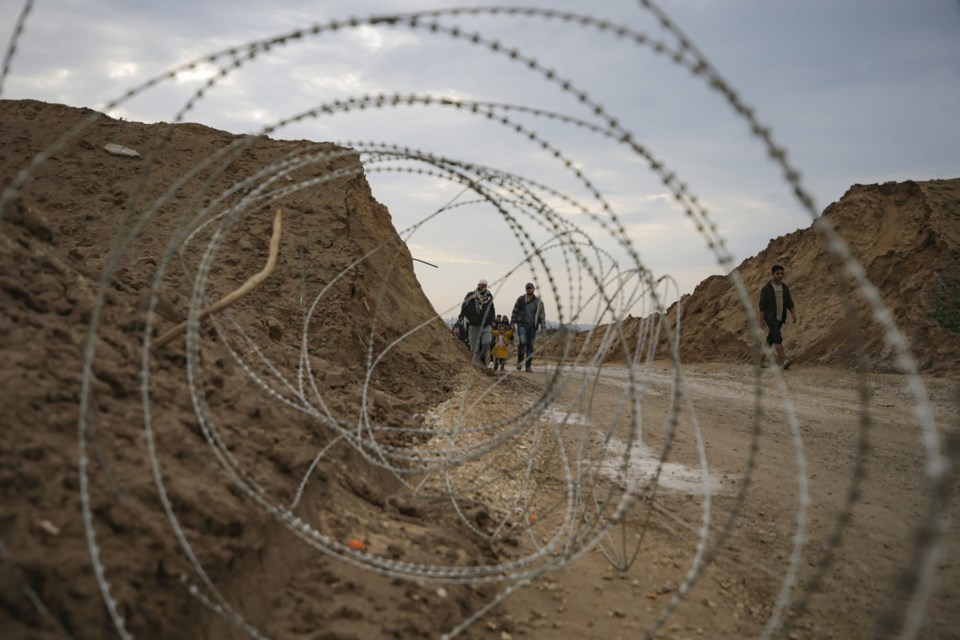JERUSALEM (AP) — Israeli Prime Minister Benjamin Netanyahu on Tuesday threatened to withdraw from the ceasefire in Gaza and directed troops to prepare to resume fighting Hamas if the militant group does not go ahead with the next scheduled release of hostages on Saturday.
Hamas said Monday — and reiterated Tuesday — that it planned to delay the release of three more hostages after accusing Israel of failing to meet the terms of the ceasefire, including by not allowing an agreed-upon number of tents and other aid into Gaza.
Amid the mounting tensions, U.S. President Donald Trump emboldened Israel to call for the release of even more remaining hostages on Saturday.
After meeting with Jordan’s King Abdullah II at the White House on Tuesday, Trump predicted Hamas would not release all the remaining hostages as he had demanded.
“I don’t think they’re going to make the deadline, personally,” the president said of Hamas. “They want to play tough guy. We’ll see how tough they are.”
Since the ceasefire took effect, Hamas has released 21 hostages in a series of five exchanges for more than 730 Palestinian prisoners. A second phase calls for the return of all remaining hostages and an indefinite extension of the truce. However, Trump’s statements about both the pending releases and plans for post-war Gaza have destabilized its fragile architecture.
It wasn’t immediately clear whether Netanyahu’s threat referred to the three hostages scheduled for release on Saturday or all the remaining hostages, which would be a departure from the terms of the ceasefire. Netanyahu's office said it “welcomed President Trump's demand."
As Trump spoke to reporters in Washington and reasserted his demands, an Israeli official who spoke on the condition of anonymity to discuss a private meeting, said Israel was “sticking to Trump’s announcement regarding the release of the hostages. Namely, that they will all be released on Saturday.”
Netanyahu's office also said it ordered the military to mobilize troops on and around the Gaza Strip in preparation for scenarios that could arise.
Trump has said Israel should cancel the entire ceasefire if all of the roughly 70 hostages aren’t freed by Saturday. Hamas brushed off his threat Tuesday, doubling down on its claim that Israel has violated the ceasefire and warned that it would only continue releasing hostages if all parties adhered to the ceasefire.
“Trump must remember there is an agreement that must be respected by both parties. This is the only way to bring back prisoners,” Hamas spokesman Sami Abu Zuhri said Tuesday. “The language of threats has no value; it only complicates matters.”
Trump is hosting King Abdullah II in Washington as he escalates pressure on Jordan to take in refugees from Gaza, perhaps permanently, as part of his audacious plan to remake the Middle East.
“We’re not going to buy anything. We’re going to have it,” Trump said of U.S. control of Gaza as the Jordanian king stood by.
Abdullah II was asked repeatedly by reporters about Trump’s plan to remake the Middle East, but didn’t make substantive comments. He also did not comment on the idea that a large number of refugees from Gaza could be welcomed in Jordan, where millions of Palestinian refugees already reside.
Palestinians and the international community have seethed over Trump's recent comments that any Palestinians potentially expelled from Gaza would not have a right to return.
During the first six-week phase of the ceasefire, Hamas committed to freeing 33 hostages captured in its Oct. 7, 2023, attack on Israel, while Israel said it would release nearly 2,000 Palestinian prisoners. The sides have carried out five swaps since Jan. 19.
The war could resume in early March if no agreement is reached on the more complicated second phase of the ceasefire. But if it does, Israel will face a drastically different battlefield. After forcing hundreds of thousands of Palestinians to evacuate to southern Gaza in the early stages of the war, Israel allowed many of those displaced people to return to what is left of their homes, posing a new challenge to its ability to move ground troops through the territory.
___
Metz reported from Rabat, Morocco. Associated Press writers Chris Megerian in Washington and Natalie Melzer in Nahariya, Israel contributed reporting.
Josef Federman And Sam Metz, The Associated Press

